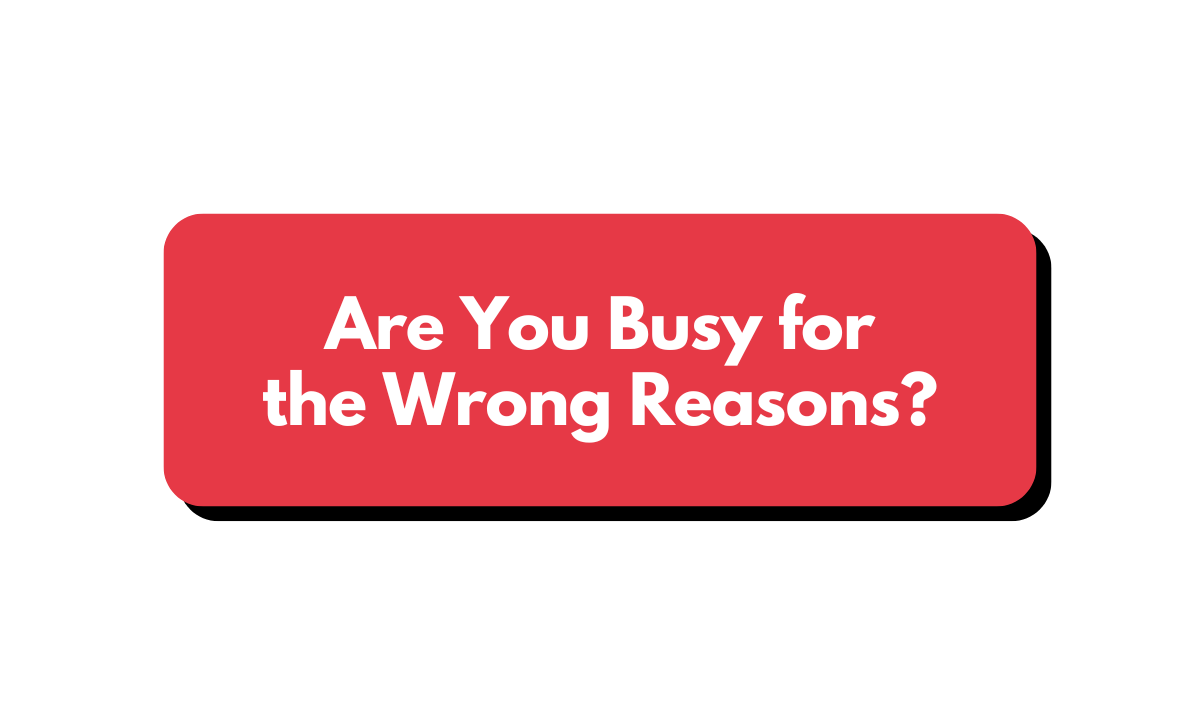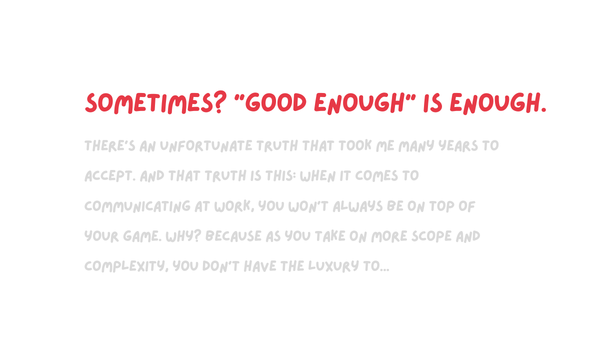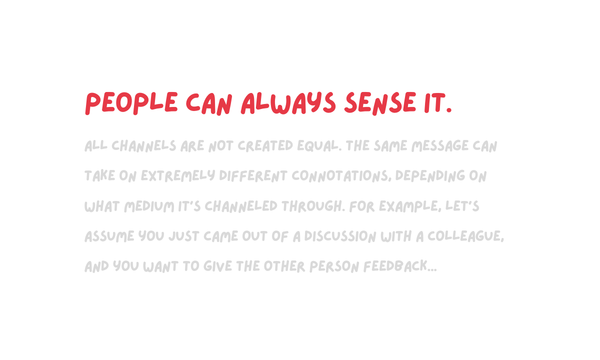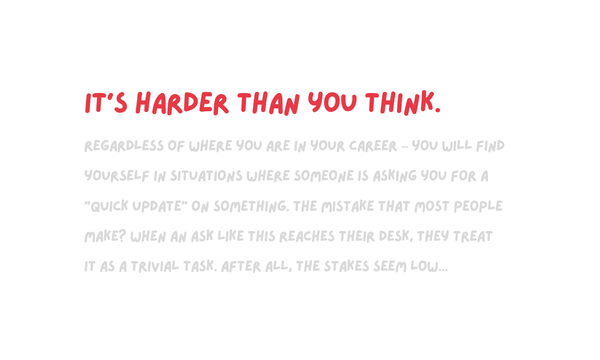How to check if you're busy for the wrong reasons

When's the last time you caught up with someone you haven't seen in a while?
Let me guess. Chances are your conversation started like this:
- You: "How've you been recently?"
- Them: "Ah, good, just really busy..."
Now, one can argue that busy-ness is a universal entry point for small talk. I'm not disputing that.
However, think about the connotation of busy-ness in this exchange. Your friend wasn't really complaining about how overwhelmed they are.
Instead, "busy-ness" was their way of implying that they were productive, valued, and useful.
Why do we do this?
Motion ≠ Progress.
For far too long, we have been conditioned to equate motion with progress.
They're often correlated, after all.
But as we progress in our careers, these two things start to decouple. In fact, when misguided, motion sometimes might even come at the expense of progress.
Here are some examples of mistaking motion for progress:
- Writing 50 slides (when just 5 will do)
- Scheduling unnecessarily long meetings
- Building unnecessarily complicated models
- Designing unnecessarily complex processes
Busy-ness isn't inherently good or bad. But busy-ness for the sake of it is a red flag.
So if you find yourself getting busy soon? Here's 3 questions to help make sure you're not busy for the wrong reasons:
👋 Subscribe for free to get Herng's newsletter directly in your inbox.
1️⃣ "Am I trying to prove that I'm doing work?"
There's no shame in wanting to put in hard work and receive credit for it.
The disconnect happens, however, when the hard work takes place behind the scenes – and the end audience doesn't see it.
That's when people do things like:
- Build tons of slides (to showcase all the hard work involved)
- Focus too much on explaining what they did as part of a workstream (instead of the actual findings)
- Fixate on explaining all the challenges they overcame (to ensure the audience understands how hard it was)
And when people do this? Ironically, the effectiveness of their deliverable goes down. Their messages don't land well either. It backfires.
A personal example: I have worked on projects in the past where I've had to crystallize weeks of hard work into one simple slide for exec audiences.
Did it hurt? You bet. Behind every simple datapoint was countless hours of my hard work – and it pained me to think that my audience wouldn't realize it.
But was it necessary? Absolutely. It was the most effective way to land the message. It was the only way to ensure weeks of hard work didn't go down the drain due to poor packaging.
Again – there's no shame in wanting to receive credit where it's due. Just don't let it come at the expense of the quality of your work.
2️⃣ "Am I busy because I don't have full context?"
Work is always about context. Depending on the context, the same problem statement can be tackled with either a toothpick or a hammer.
And when you don't have full context – you risk putting in excessive effort (and thereby mistaking it for progress).
For example, you might be asked to estimate the impact of a certain new initiative.
But should you spend a few hours doing napkin math to get a ballpark? Or dedicate a few weeks to build a robust model? Or somewhere in between?
To make this call, you probably need further context, such as:
- Has a decision been made already? If not, by when?
- What actions would my analysis affect / not affect?
- What margin of error can we live with?
- How easy is it for us to pivot if results don't pan out?
Then you'll feel more confident in assessing whether you should invest 2 hours or 2 weeks on the exercise.
A common mistake is to compensate for lack of context with extra (yet unneeded) effort. But this is a lose-lose situation.
Instead, it is much better to ensure you have full context first – and then ringfence your efforts accordingly.
Sometimes saving yourself and your team from (unnecessary) busy work is the most productive thing you can do.
👋 Subscribe for free to get Herng's newsletter directly in your inbox.
3️⃣ "Am I fully aware of the opportunity cost?"
To be clear: not every task or project needs to have a perfect allocation of time spent. Sometimes it's highly dynamic – as it should be.
However, you should always be hyper-aware of whether your efforts in one area are coming at the expense of another.
You need to always know the trade-offs.
Of course, in an ideal world, we'd love to slightly over-invest our time and efforts on everything. We'd like to make everything slightly more than just good enough.
But that simply isn't realistic.
For example: If you're working on something that is 80% usable, but you want to invest another week to dial its quality up to 95%? Then the opportunity cost of that extra week better be minimal.
In other words: if there is something else of higher stakes that would benefit from your attention – then you might want to park your current project as is. Sticking with 80% usability isn't ideal – but sometimes it's necessary.
Burning yourself out to make everything perfect (and appearing extremely busy in the process) is not what we want. It's motion – but it's not progress.
It's a failure to assess trade-off's.
The best operators are always prioritizing and reprioritizing. They're comfortable saying things like:
- This is a quick and dirty estimate, so take it with a grain of salt. We have prioritized timeliness over precision given project timelines.
- We understand this model is slightly outdated, but given it is still directionally helpful, we suggest sticking with it – especially given competing priorities.
Key Takeaways
- The best operators don't take pride in busy-ness for the sake of it.
- Motion doesn't always equal progress. But unnecessary busy-ness tends to arise for 3 reasons:
- Trying to prove that you're doing work (or not wanting to lose credit)
- Compensating for lack of full context (and inability to make trade-offs)
- Not thinking critically about competing priorities (and implied opp. cost)


